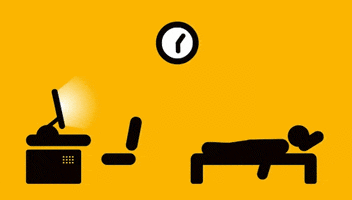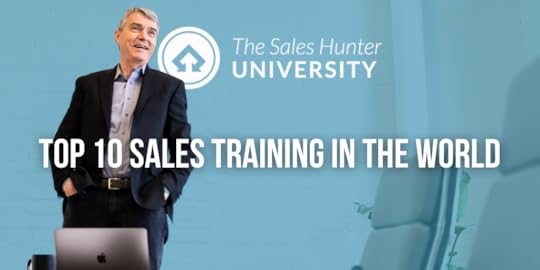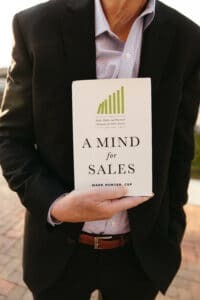Mark Hunter's Blog, page 20
April 27, 2022
7 Ways to Upgrade Your Network
Who doesn’t wake up in the morning and say, “Man, I want to be in the president’s club. I want to be at the top of the food chain. I want to be the number one person on my sales team.”
Surely you don’t wake up and say, “Oh gee, I want to be average.” No, you want to be great. Because as long as you have to work, why don’t you work to become excellent, not average. Anybody can do that.
I want you at the top.
And what I’m laying out this month are the five elements you have to master to become a top 1% salesperson. I’m lifting a lot of this content from my masterclass–enrollment is open now! Don’t miss out.
Read a sneak peek of Element 1: Time.
Read a sneak peek of Element 2: Mind.
1. Nurture your network.Your network is not something you abuse. Don’t just use your network. Instead, take care of it in a way that is mutually beneficial.
Here’s what I’ve found: The more you put into your network, the more you’ll get out of your network. It’s really a direct correlation.
Read more about how to nurture your network.

via Good Trouble on GIPHY2. Treat it like a bank account.
It is not the kind of account where. “If I put in on Monday, I can take out on Tuesday.”
No, your network is much like a savings account.
You can’t withdraw money from the bank until you first put money into it.

via MOOT on GIPHY3. Diversify your network.
Your network has several different elements.
It’s composed of subject matter experts–people who you can call on to be able to get questions answered.I have subject matter experts in my life and I love talking with them because they give me valuable insights.
There’s another portion of your network that are your customers. These are raving customers and raving fans who refer you to others, who connect you, who talk about you, who open up other doors for you.
What about the ones who you learn from and support, and they support you? This is your core group, perhaps your mastermind group.

via SoulPancake on GIPHY
And there’s a final element of your network that are just connected people. They’re outside your core group, but they’re inside your sphere in some way. They’re not in your industry, and really don’t do what you do, but are people of influence.
Top performing salespeople have people in each one of those circles. And they nurture each one of them, too.
4. Be generous with referrals.I love being able to pick up the phone, call somebody, and get some information. But you know what I love more? I love being able to pick up the phone and say, “Hey, I’ve got somebody I want to introduce you to.” That’s cool.
I love being able to have an email that comes in from somebody that says, “Hey, so-and-so said I needed to call you.” Referrals from my network are awesome. I love that. But I also love being able to refer somebody I know to somebody else.
5. The bigger the better.Your network is connections.
I’m going to use the example of email. When there was only one person in the world who had an email address, it wasn’t very useful. But now that everybody does, they can network. It was the same for social media.
The bigger your network, the more valuable your network becomes.

via xponentialdesign on GIPHY6. Invest in a small core group.
Here’s where it breaks down. Top performing salespeople know that it’s critical to have a small core group. (This is a major difference between top performing and average.)
That small core may be five to twenty-five people who they really invest in. They are contributing. They are helping them. It’s about doing everything possible to help them succeed. The great thing is, they’re reciprocating!
Therefore, when you have five to twenty-five people that you’re connecting back and forth with and you’re helping, it’s amazing how much more successful you become.
Not only will you achieve your goals, but you’ll watch these other people achieve their goals. I happen to be part of a great network of people, solopreneurs like me who are in the world of speaking and training and authoring books. And I love seeing them win.

via HBO Max on GIPHY7. Have a mentality of abundance.
The average salesperson looks at the success of others and says, “Oh, I don’t want them to win because they’re taking that victory away from me.”
On the contrary, the top performing salesperson doesn’t see any scarcity, but abundance.
When my peers win, or other people I get to work with, that makes me excited because a rising tide lifts all boats. And I know as they become more valuable, I’ll become more valuable; we help each other.
In last week’s blog, I talked about your mind. What’s interesting is if I’m surrounding myself with positive people, that crowds out the negativity.
What else does that do? It really helps me be more efficient with my time because I’m really connecting with people who have a better use of their time. It’s more valuable.
Go deeper on all of these concepts in this month’s masterclass:
 Want to learn about all five elements, but on a deeper level?
Want to learn about all five elements, but on a deeper level?
Buy Roadmap to Excellence: How to Become a Top 1% Salesperson for $59, enrollment is open now!
Act now and get a bonus offer, an exclusive invitation to my webinar all about the Inside Secrets of Top Performers. What is it that they wouldn’t want you to know? Get the masterclass, then join me on April 28th at 1 p.m. CT.
 This week on The Sales Hunter Podcast…
This week on The Sales Hunter Podcast…Have you ever been evaluated unfairly due to a metric meant to measure your success? There are plenty of sales managers out there measuring things that just don’t make sense.
This week’s episode brings Colleen Francis, author of Right on the Money to the conversation. Colleen and Mark discuss how many options are too many for a customer, and why some salespeople get so desparate they offer things they shouldn’t.
Listen on Thursday mornings for new episodes, and don’t forget to rate and review!
The post 7 Ways to Upgrade Your Network first appeared on The Sales Hunter.
April 20, 2022
7 Truths for Mastering Your Mindset
It’s incredible that your mind could ever tell you, “You can’t do this. You can’t do this.” Unfortunately, that’s what most average salespeople hear.
However, the top performing salesperson has a mindset that says, “I can find a way to do this.” Is your own mindset in that place? How does your mind measure up to these 7 truths?
It’s time to level-up with this month’s masterclass, Roadmap to Excellence: How to Be a Top 1% Salesperson. I’ll teach you more about mindset, but also time, network, accountability, and your process. Enrollment is open now.
1. You need to protect your mindset.Your mindset going into any activity determines the results you get coming out of it.
The top performing salesperson crowds out all those negative thoughts by only allowing a positive mindset.
Consider a mindset routine including preparation the night before each work day, and thankfulness each morning.
As you’ll see in my next points, too, top performers filter what they allow themselves to listen to, read, and talk about because their mindset matters.

via The Sales Hunter on GIPHY2. You become who you surround yourself with.
You see, they surround themselves with positive people. Or the content they’re reading.
They surround themselves with positive content that they’re viewing.
What are you doing to crowd out the negative mindset? There may be people that you have to stop associating with; or people that you need to start associating with. There may be websites and podcasts that you need to listen to and others that you don’t need to listen to.
Speaking of podcasts you SHOULD listen to, check out The Sales Hunter Podcast for this week’s episode!
3. Don’t dwell on the negative.If you run into a low performing person, they’re always negative. I have yet to find a low performing person who has a positive attitude. It just doesn’t happen.
Now, I’m not saying a positive attitude makes you a top performer, but you know what? A positive attitude will take that bottom performer and begin quickly moving them up the food chain.

via JCPenney on GIPHY4. Grow your mind.
What are you reading?
The top 1% are constantly growing their mind.
Your mind is the greatest app you’ve ever had. And the greatest app you’ll ever have.
Average salespeople like to think, “Well, if I just get this app, or that other thing, then I’ll be successful.”
They forget that the greatest app is right between their ears.
Instead, you’ve got to understand the value of apps. Great salespeople know that it’s their mind’s job to control the app, not the other way around. That’s the difference between settling and breaking through to that next level.
The top performer knows that they can fly solo with their mind, because this allows them to walk into any situation and be absolutely prepared.
So I’ll challenge you again:
What books are you reading? Which podcasts are you listening to? What are you doing to fill your mind with the positive insights that are going to help you be successful?Consider a 33-Day Sales Challenge with Mark’s free ebook: The Making of a Mind for Sales – 33 Strategies for Success.
5. Thankfulness breeds action.When I wake up in the morning, I take a few minutes in very quiet solitude. I’ve become very thankful for the gifts that I’ve received and how I’m going to use them. I also take a moment to be thankful for the people who are in my life.
Afterward, I begin thinking about the people who I’m going to come in contact with over the course of the day.
I remember that my objective is to influence and impact people.
Therefore, my mindset is focused on one thing: How am I going to influence and impact others? Because if I can do that, and achieve what they didn’t think was possible, how can I not get excited?

via Disney+ on GIPHY6. It’s not about the problems.
We all have problems.
It’s not the problems we face, it’s how we respond to the problems we face.
This is what your mindset is all about. Frame up your mindset to where you can handle the negativity. Because when you are full of optimism, it’s amazing how you listen better. You will be able to diagnose problems better. You’ll be more creative in outcomes and the solutions that you can come up with.
More importantly, you’re going to be far more successful.
7. Optimism attracts the right crowd.Do people typically want to hang around with negative people? No.
Well, excuse me, negative people want to hang around with negative people!
But successful people, the top performers, they’re optimists. Therefore, they want to hang out with other optimists. Those are the people you want to be hanging out with.
Certainly, positive thinking breeds more positive thinking. You want people in your circle who will lift you up, keep you accountable, and challenge you, too.
Tune in next week as we focus on the third core element: Network.
If we could snap our fingers and become excellent, a lot more people would be achieving great success.
But excellence is a journey, and it’s a process. I believe excellence in sales can be boiled down to five core elements, and I want to teach you those in this month’s Masterclass.
We’ll go in depth on time, mindset, network, accountability, and process so you can put key strategies into practice.
Whether you’re due for a tune-up in these areas, or a complete overhaul, it’ll be $59 very well spent. Enrollment is open now!
If you’re truly interested in personal and professional growth, I invite you to check out The Sales Hunter University.Become a Level 3 (All Access!) member and get access to this and every masterclass I’ve ever offered. Plus monthly coaching and office hours with me! It’s an incredible value for go-getters and those seeking excellence in their field. Learn more here.
 Do you lead your clients to their best solution? Or do you more often feel led by them?
Do you lead your clients to their best solution? Or do you more often feel led by them?Join us this Thursday for a NEW episode of The Sales Hunter Podcast with Mark Hunter and this week’s guest: Anthony Iannarino.
Mark and Anthony discuss how clients simply can’t make these buying decisions without our help, especially when they only do so every 7-10 years. Salespeople are the ones navigating these decisions day in and day out. We know better, so we can do better.
So how do you show the client they need you? Listen wherever you stream your podcasts.
Copyright 2022, Mark Hunter “The Sales Hunter” Sales Motivation Blog. Mark Hunter is the author of A Mind for Sales and High-Profit Prospecting: Powerful Strategies to Find the Best Leads and Drive Breakthrough Sales Results.
The post 7 Truths for Mastering Your Mindset first appeared on The Sales Hunter.
April 13, 2022
6 Ways Great Salespeople Master Their Time
As a sales professional, your time is valuable. And wasted time is wasted money.
Let’s explore 6 time management skills that could propel you to the top.
Today’s blog is part of a series inspired by this month’s masterclass, Roadmap to Excellence: How to Be a Top 1% Salesperson. Enrollment is now open!
1. Be ruthless.Top performers master their time.
You see there’s two ways to look at the day. You can either control the day or the day can control you.
Top performers control the day. They do this by being relentless with how they use their time. They are ruthless in terms of scheduling and following a process.
This way, there is no room left for nonsense.
Read more about time management strategies for salespeople.
2. Schedule meetings with yourself.What I mean by this is that they have meetings with themselves to be able to make sure that they’re ready to prospect, or get these customer proposals done, get this information out, etc.
Time is absolutely critical because it slips away. It’s gone. Use it efficiently.
A great way to do that is to schedule time for those things you most need, and that must include these “meetings with yourself.”

via NETFLIX on GIPHY3. Block time on your calendar.
This is one of the single biggest differences between the average performer and the top performer. Where an average performer might look at their calendar and see a “light day,” the top performer says, “Hey, I’ve only got three, four or five things scheduled. What am I going to do to fill the day to make sure it’s a productive day?”
That’s the difference between being busy and productive.
Both of those salespeople, the average and the top performer will end the day saying, “Wow, I did a lot of stuff,” but for the average performer, they were just busy checking this, checking that. For the top performer, they were actually making things happen.
Top performers ask themselves these two questions:
Is this activity I’m putting on my calendar going to help me make money or help me achieve my goals? And if it doesn’t help them achieve either of those, they’re asking themselves: Why am I doing it?
4. Be routine oriented.Top performers set the day with a critical routine. And they never deviate from that routine.
I have a very set routine that I go through for the first 90 minutes from the moment I first get up. The first 90 minutes are set. And I don’t waiver from that. It creates momentum, and it creates motion.
Those at the top are very routine oriented, and it makes them more productive.

via GIPHY5. Schedule the most difficult task in the morning.
By doing that most critical task early, you’re saving yourself a load of hurt. The thing that’s going to make you the most money should be done in the morning, because that way if the day falls apart you’ve still had a protective day.
Top performers never allow the day to slip away from them, because they know that curve balls are going to be thrown at them. But they’re prepared, because they’ve blocked time for those most important things first.

via Robert E Blackmon on GIPHY6. Create a plan for tomorrow–and beyond.
Always, always end the day prepared for tomorrow. Tomorrow begins today.
How do I know what tomorrow is going to be like unless I’ve planned for it?
In my own life, I work one to two weeks out with a very precise calendar and then the day before I get into the nitty gritty as to what exactly I’m going to do and when. What does this do? It makes me the most productive person I can possibly be.
 Are you the most productive/efficient/engaging you can be?
Are you the most productive/efficient/engaging you can be? Perhaps it’s time to work your way to the top.
Join me this month as we forge a path towards excellence. But how? What does it take? How can I move from where I am, to operating like those at the top?
I believe you can, and you will, after completing this course. My masterclass this month is Roadmap to Excellence – How to Be a Top 1% Salesperson.
Enrollment is open now for just $59. Click here for more information.
 Should sales report to marketing? Or should marketing report to sales?
Should sales report to marketing? Or should marketing report to sales?Join us this Thursday as Mark Hunter welcomes Darryl Praill to the show as they discuss the ultimate battle between Marketing and Sales. What kind of a relationship can foster success for both parties?
We appreciate your reviews of The Sales Hunter Podcast wherever you stream.
Copyright 2022, Mark Hunter “The Sales Hunter” Sales Motivation Blog. Mark Hunter is the author of A Mind for Sales and High-Profit Prospecting: Powerful Strategies to Find the Best Leads and Drive Breakthrough Sales Results.
The post 6 Ways Great Salespeople Master Their Time first appeared on The Sales Hunter.
April 6, 2022
10 Time Management Strategies for Salespeople
I continue to argue that time is our most valuable asset. What you do, and don’t do, with your time can make or break you as a successful salesperson.
Here I’ll share 10 easy tips for how to take your own time management skills to the next level. How many of these do you already practice? Which can you implement this week?
1. Take 15 minutes Sunday evening.Using 15 minutes, or 30 minutes for you overachievers, to sit down and really map out your week is critical.
First, you look back on the previous week and congratulate yourself on your success, whatever it was. It may have been something very small, but congratulate yourself. It’s amazing how it changes your attitude. Now you’re even more ready to take on the week ahead.
Next, set objectives that are going to make your week big. What are the things you want to be doing? Because if you don’t start off Monday morning with the right mindset, it’s not going to happen.

via Per Te Planner on GIPHY2. Drive the week.
It’s your job to drive the week. Don’t let the week drive you.
I see salespeople naively expecting a light week, but then it fills up because customers call them. Now you’re overwhelmed and you’ll never reach success.
You have to own the week. Set the objectives and set them by day. As I walk you through this list here, I’m going to show you how to set them by individual time periods, because this is the way you absolutely own the week.
3. Divide your week into thirds.This is absolutely key for sellers. Have one-third of your week spent on existing customers, one-third of your week spent really dealing with customers that are about ready to close, and one-third spent on prospecting.
Too many people spend all their time on existing customers, and they really don’t spend enough time getting new business. Or, they spend all their time just trying to close deals and they don’t spend enough time prospecting.
Don’t let prospecting get swept aside.
Some of you might be thinking, “Well, Mark, that’s one-third with existing customers. That’s not enough time.” That may be true in some cases, but I’ve got to sacrifice some customer service to make sure that I actually have time to get new customers. Otherwise, I won’t have any.

via The Sales Hunter on GIPHY4. Schedule your week with no open time.
Set time blocks in your calendar to be prospecting, to close these deals or write those proposals, whatever it is. But the most important meetings you set are with yourself.
Don’t let your schedule have white space.
“Well, I got this appointment in the morning, this appointment in the afternoon, and the rest of the day, I’ll just take care of everything else.” With that attitude, stuff just happens. Instead, I want you to be deliberate with your time.
Read more about How to Know if a Prospect Is Worth Your Time
5. Be ruthless with your routine.If you aren’t ruthless with your routine first thing in the morning, the day just slides by. And if you ease into your day, the rest of the day will suffer.
I am up at 4:50 every morning. At 4:50 every morning the alarm goes off, and by about 4:59, I know I’m pushing the button on the coffee maker. And I have a very set routine that takes me through my exercise, my quiet time, all the things that I do that first hour of the day. I’m very deliberate with the activities I schedule, because I’ve thought about it ahead of time.
I set something significant I want to accomplish after that set routine. It’s not, “Well, let me spend time just checking email or doing this.” No, I didn’t get up at 4:50 in the morning just to waltz around the internet. I want to get things done!
This is the difference between average and great people. They’re absolutely ruthless
6. Follow the 10:00 a.m. ruleYou want to have accomplished something significant by 10:00 AM.
I want you to take your phone. Set an alarm to go off every morning at 10:00 AM. When it does, ask yourself, “Have I accomplished something significant?” This is absolutely critical.
Now, I said I get up at 4:50 in the morning, so I don’t have the 10:00 AM rule, I have the 8:00 AM rule. By 8:00 AM, I want to accomplish something significant. Here’s what happens. If I accomplish something significant by my “deadline,” I’m jazzed! I’m pumped! And it’s amazing how much more I get done the rest of the day.
Let’s say you’ve accomplished something significant by 10:00 AM–-but the day falls apart–you still had a significant day.
Don’t put things off until the afternoon, because something very likely will come up and you’ll never get to it. Make it your goal to get the big things done early in the day.

via New Girl on GIPHY7. Use Monday morning and Friday afternoon.
For too many salespeople, these are throwaway times. They might even think that no one wants to talk to them during these times. Wrong!
I love Friday afternoons. Friday afternoon phone calls are great, because many times there are people who I can never get a hold of during the week, but I can call them on a Friday afternoon. And guess what? Boom, I’m able to have a conversation.
Monday mornings aren’t just great for conversations, but I can send out an email, and be at the top of the list. Think about it, people who don’t check email over the weekend we’ll say, which emails do they look at first? The last ones that came in! It’s the same with voicemail.
Monday mornings are very productive, and by making them so, my mindset changes and it’s amazing how I do everything else much faster, much more powerful throughout the week.
8. Tomorrow begins today.Remember what I told you about Sundays? Well, I want you to do this every day.
Never end the day without knowing exactly what I’m going to do the next day.
As I lay out my day, I break it into two hour blocks. Now, you may use one hour blocks or three hour blocks, whatever it is. At the end of every block, I evaluate myself. Did I use the time window effectively? What did I accomplish? It actually ups my game.

via ABC Network on GIPHY9. Don’t focus on the quota.
Your objective is your quota. I totally get that. But achieving your quota consists of activities, and I want you to focus on the activity. Now, I’m not all about activity just for the sake of activity. But in order for me to reach my objective, let’s say my quarterly quota, I’ve got to do ‘X’ amount of activity.
When I hear people say they’re not making their numbers, I’m going to ask them, “Well, how much time have you spent prospecting? How many phone calls did you make? How many prospects have you talked to?”
You see, the reason they’re not making their sales quota is because they’re not having enough conversations. The challenge is not the number represented by your quota. The challenge is the number of conversations.
Why is my conversation number so low? Well, probably because I didn’t set aside enough time. As a result, I ought to look at my calendar. What am I doing to reallocate time? If I do the right activities–in the right way– I’ll make my sales quota.
10. Seek to Improve by 1%.CIM stands for Continuous Improvement Model. This means every week my goal is to improve myself by 1%. If I improve myself by 1% each week, it’s amazing how much better I become.
If every week I improve myself, what does that look like?
Well, I come up with one way to write a different email, a little better email, or a slightly improved voicemail. It might seem insignificant–or it may even be that you stop doing an activity as opposed to starting a new one.
There are 52 weeks in a year. Even if I consider time off for vacations etc. you’re going to increase your performance by about 50%. Now, is your sales going to go up by 50%? No, but I bet it goes up 15 or 20%. I bet it goes up at least 10%, and who wouldn’t take that? Because when you do that year in, year out, that’s how you achieve success.
I’ve helped so many professionals get to the next level with my book, A Mind for Sales. Sometimes we just need a mindset shift. Or maybe even a mindset revamp!
I invite you to check out my book here.
Already read it? Then you’d be perfect for the A Mind for Sales Masterclass. It comes with a discussion and action guide, a 33-day journal challenge, and videos from myself with more insight. Learn more about the course here.

Join your host, Mark Hunter, in this week’s episode of The Sales Hunter Podcast as he shares strategies for setting up a mental framework built for success.
Can sales truly be a lifestyle, instead of a job? Tune in this Thursday wherever you stream your podcasts.
The post 10 Time Management Strategies for Salespeople first appeared on The Sales Hunter.
March 30, 2022
8 Characteristics of a Top-Performing Salesperson
Hey, you at least want to be in the top 10%, right? Otherwise, why are you in sales? Because GREAT salespeople don’t settle for average.
In my book, A Mind for Sales, in the final chapter, I list 18 traits that the top 1% of salespeople do. Today I’m sharing 8 of those with you. I invite you to get the book to read all eighteen.
This month is all about getting the right mindset, and not doing it alone. Check out the 5-piece masterclass bundle for A Mind for Sales here.
1. Top salespeople protect their time and the time of others.They know that the most valuable resource they have is their time, and they don’t allow it to be wasted. And they don’t allow themselves to waste other people’s time, either.
This is why they’re able to get meetings with people that other salespeople can’t, because those customers know that they’re going to respect their time, and not belabor the issue.
These individuals are disciplined and know how to use their time.

via GIPHY2. Top salespeople know that each day it’s their job to influence and impact people.
Top salespeople don’t treat customers as if they were bowling pins, where your objective is just to knock them down, take their money and run.
When their objective is to influence and impact people, it’s amazing what can happen next.
3. Top salespeople know the importance of prospecting.That’s really at the core, because what does influence and impact do? It creates a sustainable business model.
I run into too many salespeople who are good at closing deals that are literally just given to them. Excuse me, but that’s basically customer service.
Top sales people know the value of prospecting and they’re prospecting daily.
4. Top sales people never end the day without knowing what they’re going to do the next dayThis allows them to wake up and attack the day–not have the day attack them. How?
They’ve laid out and they’ve strategized how they’re going to maximize each opportunity in the day.
Top salespeople are using their time and their mind incredibly efficiently.

via ABC Network on GIPHY5. Top salespeople never stop learning.
I have a tremendous number of top 1% salespeople I coach and connect with on a regular basis. They follow my YouTube channel, they read my blog and so forth. Why? Because they know they have to be continually learning.
The number of top salespeople whom I’ve had a chance to hear from, and have read my book, A Mind for Sales is mind blowing. They say, “Mark, I read the book and wow, it was amazing how much it talked to me.”
6. Top salespeople own the process.Even though they’re top performers, they never stop learning.
They don’t make excuses. Average salespeople are very quick to blame pandemic, marketing, inflation, bad territory or whatever it might be.
Top salespeople own the process. They know it’s under their control and it’s their duty to leverage it.
When you don’t spend time making excuses, you have more time to really spend on creating solutions. Are you making excuses or are you creating solutions?

via The Daily Show with Trevor Noah on GIPHY7. Top sales people know it’s the questions they ask.
Average salespeople are very quick to develop a pitch or a demo. Top salespeople are so confident that they know it already. They understand that the best presentation ever made is the presentation never given, because they can just walk in, and have a conversation.
Through the questions they ask, things happen. That’s absolutely gold.
8. Top salespeople live each day to make the most of it.They see each day as an opportunity that they want to maximize. They live each day to make the most of it.

via The Office on GIPHY
Did you catch something about these eight characteristics that I shared? How will you measure up and maximize these traits?
 When you have a mind for sales, it is amazing what’s possible, and what you will achieve.
When you have a mind for sales, it is amazing what’s possible, and what you will achieve. I want to help you get there. Check out the A Mind for Sales Masterclass, our biggest bundle yet! For the same Masterclass price of $59, I’m offering a whopping five resources.
A detailed, chapter-by-chapter Action Guide following my book, A Mind for SalesA FREE copy of A Mind for Sales via Kindle or AudibleMasterclass videos to inspire and engage youPLUS, a copy of my new ebook set to challenge you for 33 days to take your sales to the next level.
AND an invitation to my exclusive webinar on April 1st at 2 p.m. CT, where I’ll share more insight into how to have a mindset for growth and success.
Find out more about this opportunity here.
 How’s your relationship with failure? When was the last time you learned something on a sales call?
How’s your relationship with failure? When was the last time you learned something on a sales call? This week’s episode of The Sales Hunter Podcast welcomes Jeff Bajorek as we discuss the importance of being someone your prospects want to talk to. But how do you get there? Tune in this Thursday for the new episode.
Remember to rate and review The Sales Hunter Podcast on your favorite streaming service today!
Copyright 2022, Mark Hunter “The Sales Hunter” Sales Motivation Blog. Mark Hunter is the author of A Mind for Sales and High-Profit Prospecting: Powerful Strategies to Find the Best Leads and Drive Breakthrough Sales Results.
The post 8 Characteristics of a Top-Performing Salesperson first appeared on The Sales Hunter.
March 23, 2022
How to Know if a Prospect is Worth Your Time
Too many salespeople have a pipeline that is really nothing more than a sewer line because stuff is just plugging it up. I’m talking about prospects that are sitting there, but not going anywhere.
So how do I keep this from happening?
I want to ask you five questions to keep you on track, and help you choose prospects that don’t slow down your workflow. Everything you read here today comes from my book A Mind for Sales, and the accompanying Masterclass.
1. What firm evidence do I have that this opportunity is going to materialize?The key word is firm.
It’s not your belief, nor is it your gut hunch or simply “a feeling.” What are the facts that the customer shared with you? Without evidence, your moving forward with the prospect is baseless.
I see too many salespeople chase deals and then they can’t close them. They get so close to the finish line, but they can’t get them across it because they never got the facts up front. Of course, the prospect was a nice idea, but they never had any intention to buy.

via GIPHY2. Is the opportunity sizable enough to warrant my time?
I see salespeople putting a lot of deals into their pipeline just to make themselves feel busy, but they’re so tiny. They’re so small that they’re never going to really materialize any level of business. And as a result, it’s just not going to happen. In your pipeline, you need a mixture of deals.
You need large opportunities that are going to take longer, but they’re continually moving–not plugging up your pipeline. Then, any smaller ones that pop through on a regular basis, those keep you fed.
This keeps you motivated, and keeps you in the game. But if all you have is small deals, you’ll be working your tail off and not really making any money.
Read more for 10 Tips to Fill Your Prospecting Pipeline
3. Do I know the barriers I need to remove in order to close this opportunity?I see a lot of customers who are very enthused. They’re gushing, “We want to buy this!” But then you present the offer and they say, “Oh, well I need to take it to management.” And it doesn’t go anywhere because management, or whoever is the decision maker, was never brought into the mix. This is a big issue here with salespeople! You must consider the possible barriers early on.
The question I love to ask is, “How have you made decisions like this in the past?”
I asked that early on, because I want to find out their methodology. What’s the process? Who are the people they talked to? How long does it take? Once I understand all those little nuances, I can be aware of those barriers and get them out of the way early.

via Nike on GIPHY4. Is this an opportunity that will generate sales for me at a later date?
Top salespeople value their time, and they want deals to be closing in the current period. They’re not willing to sit there and spend tremendous amounts of effort on a deal that won’t close for several years.
Now, I close big deals all the time and they take months. I’ve also got some deals that are not going to happen for three, four years. That’s fine. I stay in touch with them. We continue to nurture, but I don’t waste selling cycles on them until we get closer.
Well, what’s the definition of “closer”? It’s going to vary depending on the type of deal, and the size of the deal.

via GIPHY5. Do I have a plan to maximize this opportunity without negatively impacting other opportunities?
Here’s what I find happening: Salespeople will get this piece of business, and it’s a great piece of business, but it winds up sucking so much time and energy out of the organization that the company doesn’t have time to do other things. In fact, that customer’s relationship in the industry can block them from being able to do business with other customers. This is a much bigger issue than people realize.
I see this with solopreneurs. Solopreneurs are really guilty of this. They wind up with a bad mix of business. They have business that looks great today, but because it’s so difficult to execute and implement, it takes them forever. And as a result, it holds them back.
This was a challenge that I had early on in my career. I was literally selling myself as a CEO for hire and a CMO and a CSO for hire to various companies. And it was great, but it was consuming so much of me that I didn’t have time to sell.
 I want you to be the top performer that you can be, but in order to do that, you’ve got to get your mindset squared away first. That’s why I wrote the book
A Mind For Sales
.
I want you to be the top performer that you can be, but in order to do that, you’ve got to get your mindset squared away first. That’s why I wrote the book
A Mind For Sales
.This month’s masterclass is created to make you a leader in your sphere of influence. I recently wrote an ebook titled The Making of a Mind for Sales – 33 Strategies for Success. For 33 days, this challenge will keep you accountable to both personal and professional growth. Each day touches on a different topic, and it’s knowledge you’ll want to share!
In addition to the ebook, the masterclass course itself follows my book A Mind for Sales and includes an Action Guide with personal and group discussion questions. It’s a great tool to take yourself and your team to the next level.
PLUS, I’ll throw in a free copy of A Mind for Sales via Audible or Kindle to ensure no one gets left out.
It’s three amazing resources in one, still for just $59.
Click here to enroll and for more information.
 If you’re going to be the most powerful version of you and those around you don’t like it, those are not your people.
If you’re going to be the most powerful version of you and those around you don’t like it, those are not your people.This week’s episode of The Sales Hunter Podcast invites listeners to step into their power with our guest, Heather Monahan. Mark and Heather discuss her journey from corporate America to CEO and founder of her own company, and what it takes to be a true leader while staying true to yourself.
Tune in this Thursday for this new episode, and you can always download previous episodes here.
We appreciate your reviews! Like what you hear? Leave us a review on your favorite podcast platform.
Copyright 2022, Mark Hunter “The Sales Hunter” Sales Motivation Blog. Mark Hunter is the author of A Mind for Sales and High-Profit Prospecting: Powerful Strategies to Find the Best Leads and Drive Breakthrough Sales Results.
FollowFollowFollowFollowFollowFollow
The post How to Know if a Prospect is Worth Your Time first appeared on The Sales Hunter.
March 16, 2022
How to Nurture Your Network
It’s called the Network Triangle, and you need each part for your network to be strong and complete.
You need people to be accountable to, that’s your mastermind.
You need knowledgeable people you can call, but can also call you. It’s got to be mutual, and that’s your subject matter expert group.
Of course, you’ll also have a lot of people who influence you, that’s your largest group, but how are you influencing them?
Your network is one of your greatest assets, as I lay out in my book A Mind for Sales. Today’s blog is brought to you by my A Mind for Sales Masterclass as a sneak peek.
This month I’m offering this course bundled with my 33 Strategies for Success ebook, and a free copy of A Mind for Sales on Kindle or Audible.
It’s an incredible deal to celebrate the 2-year anniversary of my book, I hope you’ll join me.
Read more about this deal below, or click here.
 1. Don’t limit yourself, or your network.
1. Don’t limit yourself, or your network. Growing your network can take time, but nobody starts from zero.
Each person you know is an invitation to meet someone else.
Start with what might seem like a small circle of influence now, be diligent, and watch it grow.
Much like a garden, you’ve got to put in the hard work. You won’t see fruit immediately, but keep planting the seeds, removing the weeds, and watering the plants.
Watch this 90-second video from Mark about leveraging your network.
2. You cannot benefit from a nonexistent network.
Look at your network like a bank account, in order to take anything out of the account, you must first put money in.
Now I don’t mean literally investing in your network, but you surely can invest your time, effort, and clout.
Leaders leave time in their schedule so they can be available to those in their network. Do you?

via The Sales Hunter on GIPHY3. Consider your network a privilege.
The greatest privilege we have in sales is the ability to impact and help others in a manner that allows them to achieve a higher level of success.
A thriving network can be a blessing. If you don’t get excited about helping people, why are you in sales anyway?

via GIPHY4. A rising tide lifts all boats.
Sales is not a solo activity, sales is a team sport.
Let me clarify, team does not mean you and the customer, but you and everyone else you come into contact with.
Approach your network with that team mentality, and you’ll see which “positions” you need to fill to make a complete and powerful lineup.
Remember the African proverb, “If you want to go fast, go alone. If you want to go far, go together.“
5. Create a mastermind.A great way to nurture your network is to find your people. I’m in several masterminds, and they’re typically groups of four or five people that I’m in contact with regularly–that’s right, even daily.
These powerful individuals keep me accountable because they’re driven, smart, and also generous. We run ideas past each other. We make sure to give one another great referrals. As a team we share goals, and help each other achieve them.
If you’re not in a mastermind group right now, go make one!

via Jessica on GIPHY6. Be generous with referrals.
This is such a key part of network growth. The great thing is, when you give referrals, you’re also more likely to receive referrals.
Expand your network by helping others expand their network.
A good sign of a healthy mastermind is a constant mutual exchange of referrals. If you’re not reciprocating by giving good referrals to your group members, then you’re not pulling your weight.
Read more about How to Create a Referral Network.
I wouldn’t have been able to write A Mind for Sales without the support of my network.
For the 2-Year Anniversary, I’m offering an awesome course perfect for your mastermind group.
For just $59, you get the A Mind for Sales masterclass, with videos and an action guide that accompanies the book, PLUS a free copy of A Mind for Sales on Kindle or Audible.
I’m not stopping there, because I want to spark success for you. I recently wrote a 33-Day sales challenge called The Making of a Mind for Sales, 33 Strategies for Success. I’ll include a free copy of the ebook with your purchase of the masterclass. It’s an incredible deal!
Whether you do this by yourself, or in a group, those who buy the masterclass and get this bundle are destined for growth and primed for a successful 2022. (and beyond!)
Find out more information about this opportunity here.
 Introverts without planning and preparation are terrible at sales.
Introverts without planning and preparation are terrible at sales. But could introverts be capable of outselling their extroverted peers?
This week Mark and our guest, Matthew Pollard, discuss the advantages of being an introvert in the sales industry, as well as areas that introverts and extroverts each need to work on and improve.
Are you hooked on The Sales Hunter Podcast yet? Remember to rate and review us! It’s the best way for us to grow and help more people.
Copyright 2022, Mark Hunter “The Sales Hunter” Sales Motivation Blog. Mark Hunter is the author of A Mind for Sales and High-Profit Prospecting: Powerful Strategies to Find the Best Leads and Drive Breakthrough Sales Results.
The post How to Nurture Your Network first appeared on The Sales Hunter.
March 9, 2022
5 Ways to Make Monday Your Money Day
What can you do to ensure that you’re not just making calls but also making a profit on Mondays?
These Monday motivation tips come from my book, A Mind for Sales. It’s easy to get discouraged, or even develop wrong thought patterns in the sales profession. That’s why I wrote this book, to give you practical strategies to change your mindset and succeed in sales. Consider this a sneak peek!
1. Start off on the right foot.How you choose to spend your Monday will become a key indicator for how you will spend the rest of your week.
Spending time getting motivated is never your most productive task. Instead, choose action. The most productive activity is customer-facing time.
Spending time eyeball-to-eyeball with customers starting on Monday will not only open doors, but also give you confidence for the week ahead.
Remember: Confidence creates confidence. Motivation creates motivation. Momentum creates momentum. And success creates success.

via The Grinder on GIPHY2. Tomorrow starts today.
Monday does not start on Monday. Don’t allow Sunday to end without knowing what you’re going to do tomorrow.
Hitting the ground running on Monday will help propel you to success the rest of the week.
The most successful salespeople are those who know what they’re going to do next week before the current one has ended. Yes, that means I have goals in mind before I sign off on Friday afternoon–and if not before the weekend, definitely before my head hits the pillow on Sunday.
3. Get ahead of the competition.
Monday is 20% of the workweek. You cannot use Monday to organize your week. Your competitor is out there getting business that should be yours because you’re wasting your Monday. Any organization or goal setting should be done at the end of the previous week, or on the weekend.
Or, go ahead, take Monday off and let your competition have all your business.

via Rise at Seven on GIPHY4. Great conversations can happen on Mondays.
Monday cannot be an excuse to not engage with customers. There are plenty of customers that will talk to you on Monday–even Monday morning!
In fact, calling on a Monday morning sets the tone for what working with you will be like. It shows initiative and confidence. Now you’re seen as someone who wants to help them sooner than later.
Plus, Mondays are a perfect time to reach out to existing customers and make follow-up calls. I have great conversations on Mondays with customers, and have even gained incremental sales because I reached out.
Read more about the 6 Best Times to Call Prospects.
5. Plan for success before 10 a.m.Schedule three to five calls that focus on selling–all which occur before 10 a.m. That way you start off your day doing what you do best, selling.
The sooner you start, the sooner you’ll see results.

via The Tonight Show Starring Jimmy Fallon on GIPHY
Change your mindset. Change your Monday.
 Want to know more ways to make your next Monday powerful? I have many more tips and strategies in my book,
A Mind for Sales
.
Want to know more ways to make your next Monday powerful? I have many more tips and strategies in my book,
A Mind for Sales
. In fact, this weekend my publisher, Harper Collins, is offering 50% off their Mark Hunter collection, plus free shipping when you purchase on their Leadership Essentials website.
Feeling stressed out or burned out? It’s time you get A Mind for Sales.
Set a reminder, the 3-day sale starts this Friday, 3/11!
 How to Be a Business Consultant and Not a Vendor
How to Be a Business Consultant and Not a Vendor In this week’s episode of The Sales Hunter Podcast, we dive into DISCOVERY vs. DEMO with Mike Weinberg.
How can you make your demo relevant? Mike and Mark discuss how slowing down in the beginning phase can ease the rest of the sales process.
So what does that look like? Listen Thursday morning to hear more!
Like what you hear? Please leave us a review wherever you listen to your podcasts.
Copyright 2022, Mark Hunter “The Sales Hunter” Sales Motivation Blog. Mark Hunter is the author of A Mind for Sales and High-Profit Prospecting: Powerful Strategies to Find the Best Leads and Drive Breakthrough Sales Results.
FollowFollowFollowFollowFollowFollow
The post 5 Ways to Make Monday Your Money Day first appeared on The Sales Hunter.
March 2, 2022
5 Tips to Never Discount Your Price Again
Bam! A buyer has backed you into a corner, discounting seems inevitable, and you’re wondering, “How did I get here?”
What if you never had to be in that position again?
Check out these five tips to never discount your price–all coming directly to you from my newest Masterclass about Pricing.
Interested in learning more than what you’re reading here? Click here for more info.
1. Present price in person.Don’t just throw your offer out to somebody by way of an email. No. It’s too easy for them to push back and say, “Hey, your price is too high,” or “Let’s tweak this, let’s change that…”
I want to go eyeball-to-eyeball, even if I’m meeting virtually.
I never send the proposal until 30 seconds before I meet with them. The goal is to get them face-to-face, so I send the proposal and then I’m going to walk them through it. This is going to help me present to you, the customer, the full value and benefit of what you’re going to get.
Read more about Pricing Rules I Wish I’d Known About Earlier
2. Tie price to time.Time is something we can’t make more of. It’s gone. So I want to link price to time. How? I make sure that all my offers have an expiration date. But more importantly, I let customers know that by making the decision today, you’re going to be able to start reaping the benefits tomorrow. And by the end of the next quarter, or whatever period of time, this is what’s going to happen.
You want them to realize that delaying the decision is not in their best interest. In fact, delaying the decision only hurts their ROI. So it is really incumbent on them to actually accelerate. In turn, that makes the deal worth more to them because they’re going to get more ROI out of it.

via GIPHY3. Tie to the customer’s needs.
I never present a price by saying, “Hey, it’s going to be $10,000 and you’re going to get X, X, and X.”
Instead, try: “It’s $10,000 and this is going to help you do X, X, X.” Notice the difference?
In the former, I was stating a price and just telling you what you’re going to get. In the second, I present the price, $10,000, and here’s what you’re going to be able to do, because you’re going to be able to achieve these outcomes.
You always link your price to the customer’s needs.

via GIPHY4. Present with confidence.
If you can’t present with solid eye contact, a strong voice, and confident body language, guess what? There’s a discount to be had.
I’ve had more purchasing agents tell me this. They say, “When a salesperson’s sitting across from us at the desk or online, if they can’t give me eye contact when they present the price, it’s amazing how we know there’s a discount.”
Of course, it’s the same thing with your voice and body language. However, your vocabulary also has an impact. I’ll give you an example of weak vocabulary:
“Well, here is the package we came up with and we think this is a good price. What do you think?”
When you say, “What do you think?” you’re inviting the customer to discount. I don’t think you should ever ask. You tell the customer the price. And when you tell the customer, you communicate it with confidence.

via Law & Order on GIPHY5. Be prepared to walk away.
You can never go into any deal without being prepared to walk away. If you’re not prepared to walk away, you will be emotionally tied to it and you’ll wind up giving away the farm.
Purchasing decisions on your end need to be non-emotional.
On the other hand, you want to make them emotional for the customer. You want them to feel the pain and the agony if they don’t make a decision, while you stay calm, cool, and collected.
Because if you get emotional and you are not prepared to walk away, you’ll start cutting your price. And once you cut your price once, you’ll cut your price again and again and again. And then one day you’ll wake up and think, what happened to my profitability?
 Tough times are (thankfully) temporary. But tough times can also create new opportunities.
Tough times are (thankfully) temporary. But tough times can also create new opportunities. Tune in to this week’s episode of The Sales Hunter Podcast with Paul Reilly. Paul argues it’s not about giving your customer a cheaper price, but rather about making them more money. Want to know what that looks like? Join Mark and Paul as they discuss how to demonstrate value sooner and how you can help yourself, and the prospect, to look more long-term.
Listen wherever you stream podcasts.
Like the podcast? I’d appreciate it if you’d rate and review the podcast and give your feedback!
 Congratulations to The Sales Hunter University!Named Global Guru’s Top 10 in the World’s Best Sales Development Programs–2 years in a row!
Congratulations to The Sales Hunter University!Named Global Guru’s Top 10 in the World’s Best Sales Development Programs–2 years in a row!I’m proud of all that The Sales Hunter University has accomplished, but I’m even more excited about what it has to offer for sales leaders around the world.
This past month we released another successful masterclass all about Pricing. There’s an incredible course list at The Sales Hunter University which you can find here. Or, did you know you can become an All Access member and get unlimited access to EVERY masterclass? See the full list of perks All Access members enjoy here.
Copyright 2022, Mark Hunter “The Sales Hunter” Sales Motivation Blog. Mark Hunter is the author of A Mind for Sales and High-Profit Prospecting: Powerful Strategies to Find the Best Leads and Drive Breakthrough Sales Results.
FollowFollowFollowFollowFollowFollow
The post 5 Tips to Never Discount Your Price Again first appeared on The Sales Hunter.
February 23, 2022
6 Pricing Strategies for Success
When learning about your prospect becomes knowing your customer, you can customize that value.
There are six things you should know and have in your prospecting tool belt before you present your next price.
Like today’s sneak peek? Get the full Pricing Masterclass here, I’ve got plenty for you to learn, and perhaps unlearn about how to get full price and stop discounting.
1. Your confidence impacts the price.Never allow a price to go out the door without legs being attached to it. In other words, allow your human presence to do the work. Don’t sit there and think, “Well, I’m not sure if they’re going to take it, so I’m just going to email it to them and feel them out.” No, that’s bad.
Instead, communicate your price eyeball to eyeball. That means if you have a meeting set up with them, you don’t send that proposal until 30 seconds before that meeting is scheduled to begin.
Don’t allow your customer to see your proposal without seeing you at the same time.
Your confidence is going to determine the price you get. If you don’t believe in your own price, how do you expect your customer to believe in it? They won’t.
Read more about 5 Pricing Rules I Wish I’d Known Earlier.

via The Sales Hunter on GIPHY2. Value must exceed price.
If you’ve done your homework in the selling process, you’ve uncovered benefits that they’re looking for. You have discovered the needs that they have and the outcomes that they’re looking for. In addition, you have really been able to quantify and qualify them as to what they’re worth. And the sum of those values has to exceed the price.
Because remember this: customers don’t buy, they invest. When I know that I’ve got so much value in this proposal that it exceeds the price, then I’m good to go.
3. Know the value of time and money.
Money means different things to different people. Time means different things to different people. You have to understand both. If you don’t, then you’re in a world of hurt.
If you create enough value, you can link it to time. In other words, if the customer doesn’t put your product or service into practice now, guess what? They’re not going to reap the rewards.
What’s that going to cost them?
How much is that going to cost them?
These kinds of questions to the customer are linking time and money. Other elements to consider: Is this part of their capital expenditures? Is this a routine expense? Is this something that they’re going to be able to buy right now at this time of year and be able to get full value out of this year? Or is it going to have to extend over several years?
When I begin to understand the value of time and money, it’s amazing how it begins to change the price that I can ultimately get you to pay.

via Picture Press Play on GIPHY4. Customers don’t buy, they invest.
Nobody buys anything. Whether it be B2B, business to business, or B2C, business to consumer, they don’t buy.
A company may be looking to buy new office furniture for their employees. Of course, they’re not buying just for the sake of buying. They’re investing, because they want their employees to be more productive and to keep employees happier, and thus be able to retain people. As a result they’re also able to attract better people, which in turn creates a better image for customers…it goes on. They’re investing.
When you change this around and ask yourself, “Would I make this investment?” Knowing their situation, their benefits, their needs, their issues, the outcomes that they’re looking for, would I buy? Would I invest?
It begins to change the perception in your mind, and you begin to see the investment as ROI, return on investment.
Learn more about how to communicate ROI to customers in this month’s Pricing Masterclass!
5. Create uniqueness.This is so critical because there are more options out there than ever before.
The best way to create uniqueness is you.
You are unique. And when you can be that individual who can bring your customer insights they can’t get from anybody else, they’re seeing something that they can’t get elsewhere. You are now a commodity.

via Coolidge Corner Theatre on GIPHY6. Have a plan.
Never just throw out a price.
When I have a plan, I now have a methodology, and I’m going to be more confident.
Not only that, I’m going to create a better outcome for both the customer, and for me.

via The Fast Saga on GIPHY
We are wired to want to connect with people.
Check out The Sales Hunter Podcast’s new episode with Andy Paul as it goes LIVE on Thursday a.m. Andy and I will be sharing strategies for creating positive buying experiences, so we sell IN instead of selling OUT.
Listen wherever you stream your podcasts.
 You CAN close more deals at full price.
You CAN close more deals at full price. This month’s masterclass, Pricing: How to Avoid Discounting and Sell at Full Price is a giant that can bring you great returns. I’m bringing so much easily applicable content to make sure we’ve covered our bases.
I’ll share my own strategies for selling at full price, and examples of how I respond to customer objections. See the full course contents, and enroll here!
 World’s Best Sales Development Program for the 2nd Year in a Row!
World’s Best Sales Development Program for the 2nd Year in a Row!
The Sales Hunter University continues to win awards and change lives through great content, applicable strategies, and real-world insight.
Check out our full course list here.
Or, consider an All Access Membership, and receive unlimited access to all Masterclasses, plus live coaching and office hours with Mark each month. There’s a reason we’re turning heads and winning awards! Find out why here.
Copyright 2022, Mark Hunter “The Sales Hunter” Sales Motivation Blog. Mark Hunter is the author of A Mind for Sales and High-Profit Prospecting: Powerful Strategies to Find the Best Leads and Drive Breakthrough Sales Results.
FollowFollowFollowFollowFollowFollow
The post 6 Pricing Strategies for Success first appeared on The Sales Hunter.
Mark Hunter's Blog
- Mark Hunter's profile
- 25 followers





